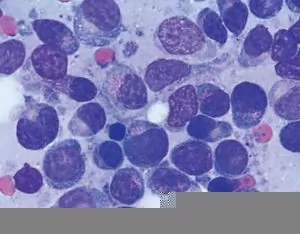What is Lymphoma?
Lymphoma in cats is a cancer of the lymphocytes, which are cells that are involved with the immune system. Since these cells travel throughout the body, lymphoma in cats is considered a systemic disease versus a localized one.
Lymphoma in cats has been connected with feline leukemia, and though more cats are now being vaccinated against leukemia, lymphoma is still one of the most common cancers diagnosed in cats.
Different Types of Lymphoma in Cats
Though lymphoma in cats is considered a systemic disease, there are three main forms of the disease based on where it originated and which organs are mainly affected. These three forms include:
- Intestinal lymphoma: This is the most common form of lymphoma in cats, as it makes up nearly 60% of the diagnosed lymphoma cases. This disease affects the intestinal tract in cats.
- Renal lymphoma: This form of lymphoma affects the kidneys and can mimic the signs of renal disease and failure in cats. This form of the disease is often associated with feline leukemia, as 50% of cats diagnosed with renal lymphoma have feline leukemia.
- Mediastinal lymphoma: This form of lymphoma affects structures such as the thymus and the lymph nodes in the chest, and is most often associated with feline leukemia over all other forms. Almost 80% of cats diagnosed with mediastinal lymphoma also test positive for feline leukemia.
What are the Clinical signs of Lymphoma in Cats?
The clinical signs of lymphoma in cats will vary based on which organ system is affected. Symptoms according to each form of lymphoma include:
- Intestinal lymphoma: Since the intestines are affected in this form of the disease, cats will experience gastrointestinal symptoms such as weight loss, vomiting, diarrhea, change in appetite, etc.
- Renal lymphoma: Since the kidneys are affected in this form of the disease, cats will often mimic signs of kidney disease and renal failure. Symptoms include increased thirst, decreased appetite, weight loss, and vomiting.
- Mediastinal lymphoma: This form of the disease affects structures in the chest, so respiratory symptoms are often present. Fluid will often accumulate in the chest leading to respiratory distress and difficulty identifying tumors on X-ray.
Diagnosis of Feline Lymphoma
In order to definitely diagnose lymphoma in cats, you must be able to identify cancerous cells under microscope examination. This can be done by using fine needle aspiration to pull cells from an inflamed lymph node, an inflamed kidney, or any other structure of concern.
This can be done by aspirating a sample from a palpable mass, or aspirating from a structure found during an ultrasound of the affected area. Surgical biopsy is always an option as well, though it poses more of a risk to sedate a potentially ill cat. Though it can be more risky, it is often necessary if the results of the fine needle aspirate are inconclusive.
Aside from fine needle aspiration or potential biopsy is the need for diagnostic blood work, as it’s important to rule out any other causes that could be leading to the cat’s symptoms as well.
Treatment of Lymphoma in Cats
Lymphoma in cats can be treated with chemotherapy. When the owner’s funds allow and the cat is not gravely ill, chemotherapy is the ideal treatment option as cats tolerate chemotherapy much better than humans.
When we think of chemotherapy, we often think of hair loss, vomiting, and an array of other troubling symptoms. Luckily, very few cats suffer from these complications, and most even maintain a healthy appetite during their treatment.
If a cat is incredibly ill or the owner’s finances do not allow for chemotherapy, you can consider using steroids for palliative care. Steroids will not treat their lymphoma, but it will provide temporary relief of their clinical signs and buy a bit more time for the cat.
Though many tend to think of surgical removal when cancer is involved, surgery alone is not an ideal method of treatment for lymphoma in cats. Since lymphoma is considered a systemic disease, surgery by itself will not often resolve the condition and they will still require chemotherapy for the best chance at remission.
What is the prognosis for lymphoma?
Like many other diseases, the prognosis of lymphoma in cats will vary depending on each specific cat. Overall health of the cat, the cats feline leukemia status,how long this disease has been present, and each form of lymphoma will result in an entirely different outcome.
The prognosis based on each form of lymphoma are:
- Intestinal lymphoma: The prognosis for intestinal lymphoma will vary depending on whether it’s high grade or low grade lymphoma based on laboratory examination of the sample. If the cat has low grade intestinal lymphoma, they have a large chance of going into remission with chemotherapy treatment. If the cat has high grade lymphoma, they may experience short term relief with treatment, but will often become ill again between 2-8 months. High grade lymphoma is of course more fatal.
- Renal lymphoma: Because of the kidneys involvement in this form of the disease, cats have a very poor prognosis. Renal lymphoma mimics kidney failure, which results in a build up of toxins in the body. Aside from the renal complications of renal lymphoma is the large probability of this form of lymphoma spreading to the brain. Cats with this disease have a poor prognosis of 3-6 months.
- Mediastinal lymphoma: This form of lymphoma will often have a partial response to chemotherapy treatment, then symptoms will return shortly after. Many cats will experience a build-up of fluid in the chest that will require immediate attention, and at this point many owners choose to humanely euthanize due to the severe respiratory distress and the aggressive care that would be needed to move forward. Average prognosis of mediastinal lymphoma is 3-9 months.
Summary
Lymphoma in cats is an aggressive disease that should be well understood among veterinary professionals and pet owners. Make sure to keep your cats vaccinated and protected against feline leukemia, and you can help lessen the chance of them being affected by this disease.
If you enjoyed this article, take a look at our article on Feline Leukemia (FeLV), and learn more about the condition that is so often associated with feline lymphoma.


